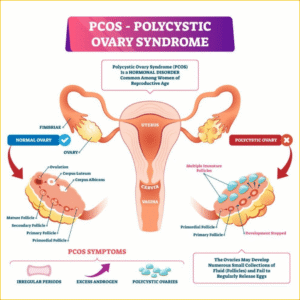
5 Medical Conditions Behind Unexplained Weight Gain

5 Medical Conditions Behind Unexplained Weight Gain
Why diet and exercise aren’t always enough?
We all know that the basics eating right and moving more are essential for weight control. But sometimes, the scale keeps creeping up even when we’re doing all the right things. For many people, the underlying issue isn’t lack of effort; it’s a silent medical condition. Today, we explore five key causes of unexplained weight gain and how you can take proactive steps toward better health.
Condition 1: PCOS and Hormonal Weight Gain
Polycystic Ovary Syndrome (PCOS) is a common hormonal disorder affecting up to 15% of women. It involves excessive androgens (male hormones), irregular menstrual cycles, potential cysts, acne, and often, unexplained weight gain around the abdomen.
The reason PCOS contributes to stubborn fat accumulation lies in insulin resistance. Many individuals with PCOS don’t respond well to insulin, leading to higher levels that promote fat storage and increase androgen production. This causes a chain reaction: more androgens lead to more insulin resistance, and the cycle continues.
Due to these complex hormonal imbalances, weight gain from PCOS isn’t something that can be addressed by diet alone. It often requires medical strategies like guided lifestyle plans, insulin-sensitizing medications, or hormonal therapy.

Condition 2: Fatty Liver and Metabolic Dysfunction
Fatty liver disease, especially non-alcoholic fatty liver disease (NAFLD), occurs when excess fat builds up in the liver. This condition can affect metabolism and make weight management more difficult. It’s often tied to insulin resistance, high cholesterol, and type 2 diabetes.
When your liver is overloaded with fat, it doesn’t function efficiently. It can’t metabolize fats and sugars the way it should, which causes fatigue, slows fat-burning, and leads to inflammation. Even though symptoms may not be obvious at first, the long-term metabolic effects are significant.
Fortunately, fatty liver can be reversed. Studies show that a 5–10% reduction in body weight can improve liver function dramatically. Treatment plans often include a tailored diet, increased physical activity, and in some cases, prescribed medications like GLP-1 agonists or SGLT-2 inhibitors.
Condition 3: Vitamin D Deficiency and Slowed Metabolism
Vitamin D is most commonly linked to bone health, but it also plays a role in metabolism and fat regulation. A deficiency in Vitamin D can lead to insulin resistance, inflammation, and even fat accumulation in the liver.
Many people today have low Vitamin D levels due to indoor lifestyles and lack of sun exposure. This deficiency affects the way your body breaks down fat, how insulin is regulated, and even how you feel daily. Low energy levels and sluggish metabolism often go hand-in-hand with weight gain.
Correcting Vitamin D levels through supplements and dietary sources can help restore balance. While it’s not a magic weight loss pill, it supports metabolic function and makes other health efforts more effective.
Condition 4: Vitamin B12 Deficiency and Low Energy
If you’re constantly tired and find it difficult to stick to healthy habits, low Vitamin B12 could be to blame. This nutrient plays a crucial role in energy production, red blood cell formation, and proper brain function.
When B12 levels are low, you may experience fatigue, weakness, brain fog, and even mood changes. These symptoms can make it harder to stay active and choose healthier foods, which indirectly leads to weight gain over time.
Some studies also link low B12 levels directly to increased fat accumulation. Restoring this nutrient through injections or oral supplements can improve energy, motivation, and metabolic performance.

Condition 5: Gut Health Imbalances
Your gut is home to trillions of bacteria that affect digestion, nutrient absorption, and fat storage. When the balance of good and bad bacteria is disrupted a condition called dysbiosis it can lead to inflammation, slower metabolism, and increased fat storage.
Factors like stress, antibiotics, poor diet, and low fiber intake can damage gut health. This leads to bloating, irregular digestion, cravings, and sluggish metabolism.
Improving gut health involves a complete lifestyle shift. Eating more fiber-rich fruits and vegetables, fermented foods like yogurt or kefir, and reducing sugar and processed foods can make a big difference. When your gut thrives, your metabolism improves, and so does your ability to manage weight.
Modern Assessment and Treatment Options
At Midas Wellness Hub, we believe in treating the root cause, not just the symptom. Unexplained weight gain needs a deeper, personalized medical evaluation. This starts with comprehensive tests to assess hormones, vitamin levels, liver function, and metabolic health.
Based on your results, your treatment plan may include hormone balancing for PCOS, vitamin D and B12 supplementation, liver-focused protocols, and gut health restoration.
Once your internal health is stabilized, we offer advanced non-invasive treatments to support your transformation:
Cryolipolysis: A popular fat-freezing treatment that targets stubborn fat areas
Body contouring and sculpting: Techniques that tone the body, tighten skin, and reduce localized fat
Radiofrequency and EMS therapies: These stimulate muscle contractions and reduce fat cells simultaneously

These aesthetic tools are not replacements for health they are enhancements. When paired with a holistic treatment plan, they help boost confidence and reflect the progress happening inside your body.
Bringing It All Together
Addressing unexplained weight gain starts with listening to your body. When traditional methods like dieting and working out don’t deliver results, it’s time to dig deeper. Medical conditions like PCOS, fatty liver, vitamin deficiencies, and gut imbalances are not just health issues they are roadblocks that deserve targeted solutions.
At Midas Wellness Hub, we guide you through every step of your wellness journey from medical assessments to personalized diet plans, supplements, and modern body contouring options. Our approach is not one-size-fits-all. It’s uniquely crafted for you, because true transformation begins from within.
If you’ve been feeling stuck, tired, or frustrated with your weight, we’re here to help you glow differently with science, compassion, and results you can see and feel.
About Midas Wellness Hub
Located in Borivali West, Mumbai, Midas Wellness Hub is a premium destination for holistic transformation. We blend medical expertise with modern aesthetics to help you feel confident in your body and health.
Book your consultation today and take the first step toward a healthier you.
FAQs
No, it isn’t. PCOS-related weight gain is stubborn, but not permanent. With the right combination of hormone-balancing treatments, insulin support, and a personalized lifestyle plan, many women see noticeable improvements in their weight and overall health. Medical monitoring is key for long-term results.
Yes. Research shows that losing just 5–10% of your body weight can reduce fat buildup in the liver and improve liver enzyme levels. Pairing dietary changes with medical guidance and safe physical activity is the most effective path. In some cases, medications or supplements may also be recommended.
While Vitamin D alone won’t cause weight loss, correcting a deficiency can support better metabolism, insulin sensitivity, and energy all of which make it easier to lose weight. A balanced plan with Vitamin D, when needed, can amplify other wellness strategies.
Common symptoms include fatigue, brain fog, tingling in hands or feet, mood changes, and low stamina. A simple blood test can confirm your B12 levels. At Midas, we include this in our routine metabolic assessments.
Absolutely. A healthy gut helps regulate hunger hormones, inflammation, and nutrient absorption. Imbalances can lead to bloating, weight gain, and sugar cravings. That’s why we often include gut support as part of our holistic wellness programs.
